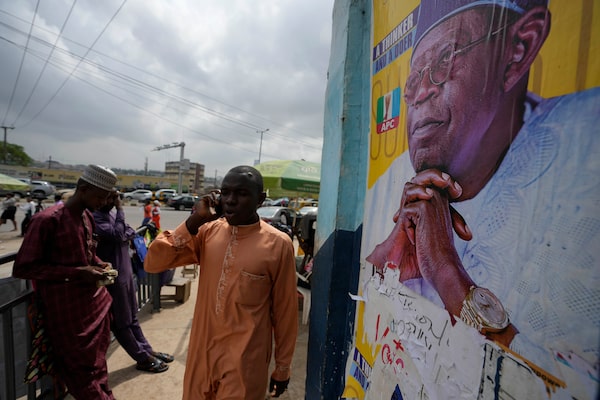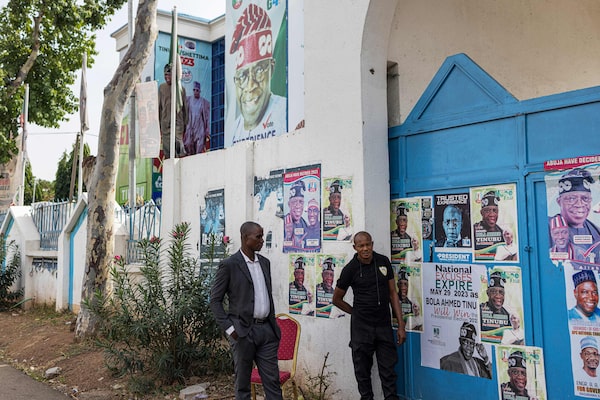
People walk past posters of presidential candidate Bola Tinubu of the All Progressives Congress in Lagos, Nigeria, on Feb. 27. He is widely described as the 'godfather' of politics in the city.Sunday Alamba/The Associated Press
Bola Tinubu, the wealthy kingmaker of Nigerian politics for decades, has taken a strong lead in Nigeria’s presidential election and is now the favourite to become the country’s new leader, despite a stunning defeat at the hands of third-party candidate Peter Obi in his home base of Lagos.
Mr. Tinubu, the candidate of the ruling party, is widely described as the “godfather” of politics in Lagos, the biggest city in Nigeria, and was an influential backroom force behind the rise of President Muhammadu Buhari, who is stepping down after two terms. “It’s my turn,” the 70-year-old power broker has told audiences at campaign rallies in recent weeks.
But while the early results on Monday suggested that Mr. Tinubu is likely to win nationally in Africa’s most populous country, he suffered an unexpected setback in his key stronghold of Lagos state, where he had served as governor for eight years.
His narrow loss to Mr. Obi – who received 582,454 votes in Lagos, about 10,000 more than Mr. Tinubu – was a sign of the discontent of young urban voters, many of whom turned to the third-party candidate in frustration over Nigeria’s economic stagnation and rising poverty.
Mr. Obi’s strong performance will shake up Nigerian politics, overturning the traditional dominance of two major parties and signalling that the system is vulnerable to outside challenge. The 61-year-old politician had campaigned as the candidate of youth, in a country where 40 per cent of registered voters are under the age of 34 and where the candidates of the two major parties were both septuagenarians.
Despite large crowds at his rallies, Mr. Obi could not overcome the vast financial resources and organizational machinery of Mr. Tinubu and the ruling All Progressives Congress. His own party, the Labour Party, is tiny in comparison and holds just a handful of parliamentary seats.
He was running third in the early national results on Monday, with about 18 per cent of the vote, compared with 44 per cent for Mr. Tinubu. Even this, however, is likely to reinvent Nigerian politics and expose the widespread discontent with the two-party system that has dominated the country since the end of military rule in 1999.
Mr. Tinubu has been dogged by corruption allegations, which he denies, and persistent questions about the source of his personal wealth. His health has been frail, he avoided some campaign events, and he felt obliged to release a much-derided video of him riding an exercise bike to try to dispel concerns about his health.

A security officer stands guard next to posters of Mr. Tinubu, All Progressives Congress presidential candidate, at the party's campaign headquarters in Abuja on Feb. 27. Early results suggest he is likely to win nationally, but he placed behind third-party candidate in Lagos state over concerns about the economy and rising poverty.MICHELE SPATARI/AFP/Getty Images
Nationally, many Nigerians are deeply worried by the rising poverty rate, the steady erosion of the currency and the frequent fuel shortages, along with violent conflicts in several regions that have killed about 10,000 people in the past year and led to the abduction of about 5,000 people.
A poll last year by the Afrobarometer agency found that just 10 per cent of Nigerians believed the country was going in the right direction, and only one-fifth were satisfied with how Nigeria’s democracy was working. Both numbers have sharply declined in recent years. The poll was based on a survey of 1,600 people.
Mr. Obi, capitalizing on this mood, soared to the top of several opinion polls during the campaign. But it was always clear that Mr. Obi needed a high voter turnout – including a strong youth vote – to have any chance of transforming the grassroots enthusiasm of his supporters into a national victory.
Only 35 per cent of registered voters showed up to cast their ballots in the 2019 election. Turnout in the latest election was dampened by technical glitches and delays in the voter registration and ballot-casting processes, along with widespread voting-station violence that deterred many voters.
The two main opposition parties, the Peoples Democratic Party and the Labour Party, denounced the vote-counting process and walked out of the room where the results were being announced on Monday. They complained of a lack of transparency in a new electronic tabulation system. The PDP candidate, Atiku Abubakar, was running second in the early results with about 33 per cent of the vote.
An election observer team, organized by two U.S.-based democracy institutes, concluded that the election “fell well short” of the reasonable expectations of Nigerian citizens. The problems had eroded the trust of voters and effectively disenfranchised many people, it said.
“Logistical challenges and multiple incidents of political violence overshadowed the electoral process and impeded a substantial number of voters from participating,” the observer team said in its statement on Monday.
“Ongoing currency and fuel shortages also imposed excessive burdens on voters and election officials,” said the observers, headed by former Malawian president Joyce Banda and organized by the International Republican Institute and the National Democratic Institute.
“The delegation observed that late opening of polling locations and logistical failures created tensions and the secrecy of the ballot was compromised in some polling units, given overcrowding.”
 Geoffrey York
Geoffrey York